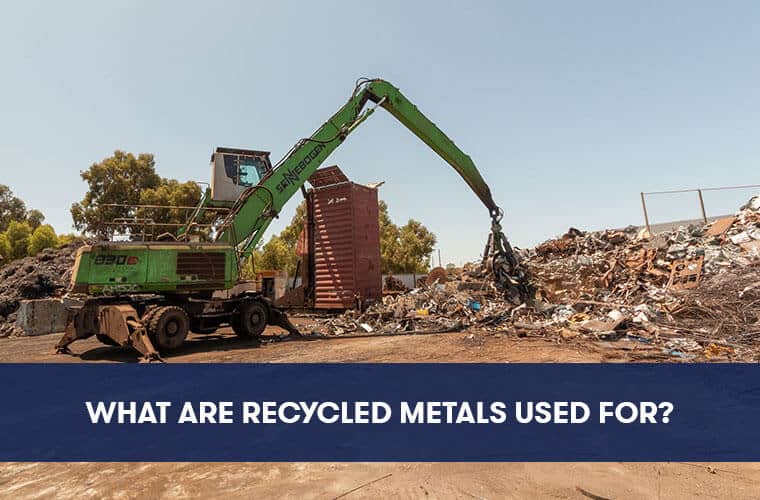No doubt you’ve probably heard about the importance of recycling metals. Recycling metals not only allows for preservation of natural resources and energy consumption. What’s more, it also prevents a number of negative effects from being inflicted upon the environment. Keep in mind that certain metals sent to landfill contain chemicals, which can contaminate the air, soil and nearby water sources. In addition to this, mining new resources can have a significant impact on both society and the Earth, through causing an increase in carbon emissions, creating unstable geological conditions such as erosion or sinkholes, and in some cases, contaminating nearby resources which can subsequently jeopardise human health.
Indeed, metal recycling as is vital toward the planet as any other type of recycling. But perhaps you may be wondering what applications these recycled metal materials are used for? Well, the good news is that metal can be recycled over and over again, without losing any of its strength or functionality. As such, these recyclable materials can be used for a variety of purposes, depending on what they are:
Aluminium
Did you know that 75% of the aluminium ever produced is still being used today? Most of the time, recycled metal materials will generally be used to create more of what they were originally used to be. For example, aluminium is most commonly utilised in the packaging of foods, including canned fish, beans, soups, fruits and vegetables, or even canned beverages such as soda or alcohol. Whenever recycled aluminium is used in the creation of new packaging such as this, there will usually be a mark on the packaging to let you know. Other uses for recycled aluminium include being used in the construction industry or the automotive industry, in the manufacture of bridges and cars or car parts.
Iron
Iron is smelted to produce pig iron, which is then used to create steel. As such, it’s an incredibly important material, and its used in a range of applications. Aside from being used to produce steel, recycled iron can also be used to create iron products, such as gates, fencing, furniture, cookware and more.
Steel
Steel is known to be the most recycled metal material in all of the world. Being highly durable, long-lasting and corrosion-resistant, it’s the perfect metal material for use in a variety of circumstances. It’s used in the marine, automotive and aircraft industries, but it’s also favoured for use in building materials such as roofing, beams and other supportive fixtures. Like aluminium, it’s also used in food packaging due to its hygienic properties. As such, it’s also ideal for cookware, kitchen accessories and other cooking appliances.
Copper
Copper is an excellent heat and electrical conductor. What this means is that it is able to allow for the flow of heat or electrical current through it effectively. As a result, copper is used predominantly in wiring or motors, in electrical equipment such as appliances or even machinery. Beyond this however, it’s also used in tubing, piping and plumbing, thanks to it’s longevity with minimal upkeep, along with its antimicrobial properties.
Looking for a Trusted Scrap Metal Recycler? Turn to Allied Metal Recyclers
If you’re ready to join the scrap metal recycling initiative, then don’t hesitate to turn to Allied Metal Recyclers today. We want to get as many people as possible into recycling their old and unwanted metal, so that as a result, more businesses and manufacturers can strive for more sustainable methods of producing their products. Our team ensures a quick and timely response to your scrap metal recycling needs, offering a full yard clearance to get scrap off your site ASAP. What’s more, we offer competitive prices in exchange for your scrap metal. Needless to say, you’ll be hitting two birds with one stone when you trust in our services.
For more on our scrap metal recycling services, get in touch with Allied Metal Recyclers today!



